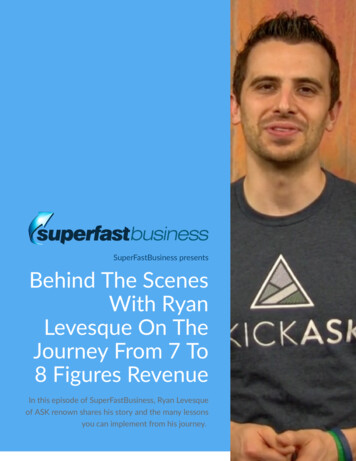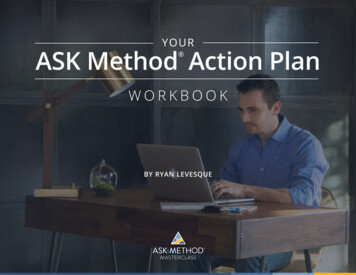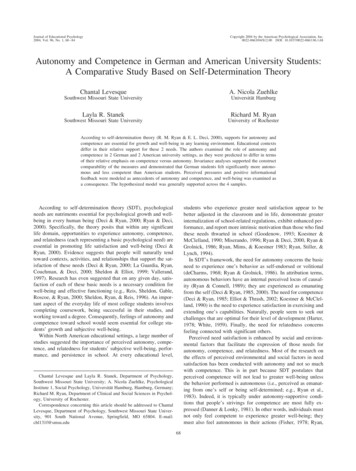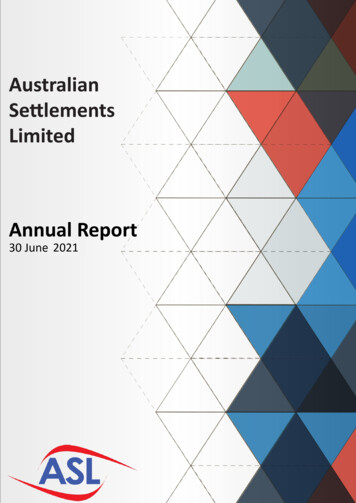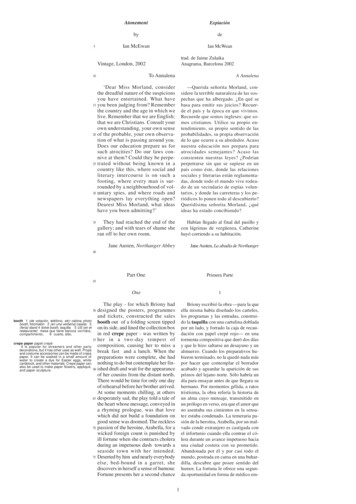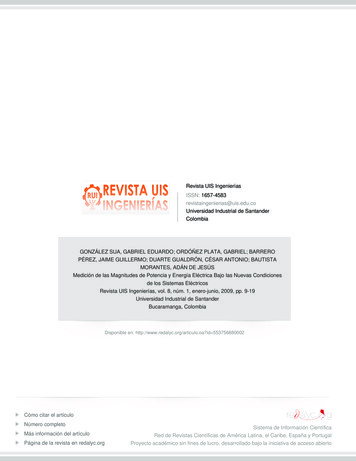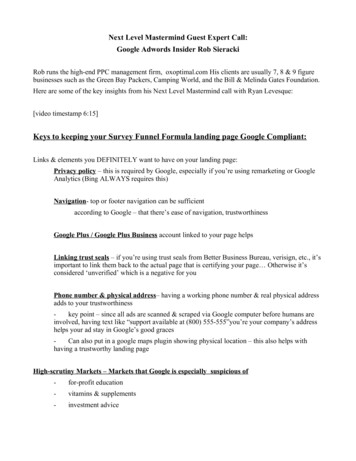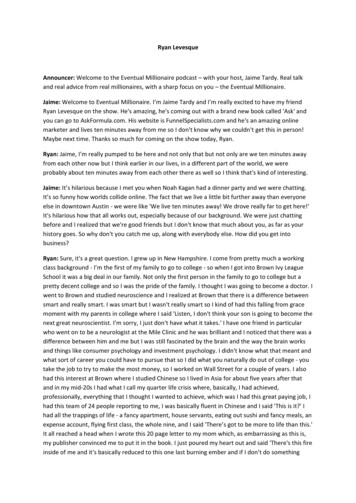
Transcription
Ryan LevesqueAnnouncer: Welcome to the Eventual Millionaire podcast – with your host, Jaime Tardy. Real talkand real advice from real millionaires, with a sharp focus on you – the Eventual Millionaire.Jaime: Welcome to Eventual Millionaire. I’m Jaime Tardy and I’m really excited to have my friendRyan Levesque on the show. He's amazing, he's coming out with a brand new book called 'Ask' andyou can go to AskFormula.com. His website is FunnelSpecialists.com and he's an amazing onlinemarketer and lives ten minutes away from me so I don't know why we couldn't get this in person!Maybe next time. Thanks so much for coming on the show today, Ryan.Ryan: Jaime, I’m really pumped to be here and not only that but not only are we ten minutes awayfrom each other now but I think earlier in our lives, in a different part of the world, we wereprobably about ten minutes away from each other there as well so I think that's kind of interesting.Jaime: It’s hilarious because I met you when Noah Kagan had a dinner party and we were chatting.It’s so funny how worlds collide online. The fact that we live a little bit further away than everyoneelse in downtown Austin - we were like 'We live ten minutes away! We drove really far to get here!'It's hilarious how that all works out, especially because of our background. We were just chattingbefore and I realized that we're good friends but I don't know that much about you, as far as yourhistory goes. So why don't you catch me up, along with everybody else. How did you get intobusiness?Ryan: Sure, it's a great question. I grew up in New Hampshire. I come from pretty much a workingclass background - I’m the first of my family to go to college - so when I got into Brown Ivy LeagueSchool it was a big deal in our family. Not only the first person in the family to go to college but apretty decent college and so I was the pride of the family. I thought I was going to become a doctor. Iwent to Brown and studied neuroscience and I realized at Brown that there is a difference betweensmart and really smart. I was smart but I wasn't really smart so I kind of had this falling from gracemoment with my parents in college where I said 'Listen, I don't think your son is going to become thenext great neuroscientist. I’m sorry, I just don't have what it takes.' I have one friend in particularwho went on to be a neurologist at the Mile Clinic and he was brilliant and I noticed that there was adifference between him and me but I was still fascinated by the brain and the way the brain worksand things like consumer psychology and investment psychology. I didn't know what that meant andwhat sort of career you could have to pursue that so I did what you naturally do out of college - youtake the job to try to make the most money, so I worked on Wall Street for a couple of years. I alsohad this interest at Brown where I studied Chinese so I lived in Asia for about five years after thatand in my mid-20s I had what I call my quarter life crisis where, basically, I had achieved,professionally, everything that I thought I wanted to achieve, which was I had this great paying job, Ihad this team of 24 people reporting to me, I was basically fluent in Chinese and I said 'This is it?' Ihad all the trappings of life - a fancy apartment, house servants, eating out sushi and fancy meals, anexpense account, flying first class, the whole nine, and I said 'There’s got to be more to life than this.'It all reached a head when I wrote this 20 page letter to my mom which, as embarrassing as this is,my publisher convinced me to put it in the book. I just poured my heart out and said 'There's this fireinside of me and it's basically reduced to this one last burning ember and if I don't do something
about it now that fire's going to be extinguished and it might be extinguished forever.' So I said'Mom, I don't know the plan,' it was really a letter to myself but I wrote it to my mom, 'I don't knowthe plan but in six months from now I’m going to be quitting my job. it's a money making plan and Idon't know if it's going to work but I know that other people have done it in the past and if they cando it I’m sure as hell smart enough and I work hard enough to do it. so I don’t want you to freak outbut I want you to know that that's there and I don't want you to bring this up ever, I just want to letyou know what's going on. My wife knows about it and that's going to happen.' Sure enough, sixmonths later I quit my job to start our first internet business. It was a bit of a rocky start. It was in2008 and in the eight years, nine years almost, we haven’t looked back. That’s the early story, the30,000 foot view. there are some interesting twists and turns and things don't always play out as youexpect but that's how I stumbled into our world - our world of online marketing or digital marking and I feel more at home doing what we're doing now than anything we've done in the past.Jaime: I love that story. It’s similar to mine - I used to travel around and all that fun stuff. I think it'shilarious - if you're not smart enough to become a doctor, become a marketer.Ryan: Exactly!Jaime: That’s what we do. What was your very first internet business? It wasn't that long ago; 2008is really not that long ago when you think about it. It feels like that but what was that first business?Tell me about the rocky start because everybody wants to hear how crappy it was for you becausenow you have success and they want to feel great.Ryan: Right, and I think this is important. I posted something on Facebook. I don't know if you knowJim Quick but he posted this image that I had seen before about the iceberg, that part of the ice isabove the surface but there's a huge part of the iceberg below and all people see is what's above thesurface. all people see is today - they haven’t seen the eight years of hard work, the 20 hour days,all-nighters, sacrificing everything, almost losing it all, the near-death experience that I had which wecan talk about, but the first business, just to answer your question, was very unusual. I was lookingat different markets and I was trying to find a market that I was really passionate about that I couldmake money in and I found that it was holding me back. Everything that I was really passionateabout didn't seem like something that I could make money in so it took my wife to find a market thatwas in the most obscure niche online ever and it was the niche of Scrabble tile jewelry.Jaime: That exists? Interesting.Ryan: It exists. Here me out. My wife, at the time, in 2008, was really into this brand new website,which was online for the first time ever, called Etsy.com. Now everybody knows Etsy. If you're notfamiliar with it, it's a marketplace, like eBay, for handmade crafts. she was dabbling in Etsy and atthe time I was living in Shanghai - based in Shanghai, travelling all around China opening up salesoffices - and my wife was getting her PHD at Hong Kong University so we were living this crazy bicountry marriage where we were two hours apart so I had a lot of time when I came home fromwork and she had a lot of time in between her studies and she stumbled upon it and she said 'Hey,Ryan, there's this cool little site called Etsy and here's the cool thing about it - look at what thesepeople are doing. they're making jewelry out of Scrabble tiles,' and the cool thing about Etsy is thatyou can see exactly how many sales someone was making every single day so we could see thatthese people were making 1,000 a day selling this jewelry - we were just adding up the sales and
we were like 'Holy crap!' So we said 'Hey, we're in China, we have access to all of this cheap labor.we're going to have this factory in southern China and we're going to be cranking out this jewelrymade from Scrabble tiles that we're going to get from Walmart and we're going to hit it big!' I realizethat was stupid - the whole reason I wanted to go into business for myself was that I wanted tohave, initially, a location independent business so that we could travel all over the world, I didn'twant to be tied to a factory or something like that, I wanted the flexibility to work when we wantedto work, so we scrapped that idea. but then she said 'Hold on a second - take a look at what thesepeople are doing,' and one or two people weren't making the jewelry itself, instead what they weremaking were tutorials on how to make the jewelry and that's when I was reminded of a phrase Iremember reading at the time in a book which was 'Remember who made all the money in the 1849gold rush? It wasn’t the people mining for gold. It was the people who were selling picks andshovels.' So I thought 'Let's sell picks and shovels. Let’s teach people how to make this jewelry.' Webought competitors' products and they were garbage - it was very poorly done - so we built thebetter mousetrap and we started selling it. initially we struggled - we didn't have any testimonials,we didn't have any traction, but over time we hustled and we took that business to a couplethousand dollars a month - this is at the tail end of 2008 - and we reached a point where I said 'Okay,this is good.' I was still working my full time job and it all came to a head when I walked into myoffice one day in the fall of 2008 and I picked up the Wall Street Journal Asia edition. At the time Iwas working for the insurance company AIG and you know what the headline on the Wall StreetJournal Asia edition said?Jaime: Uh oh. What?Ryan: AIG to file for bankruptcy. This was right in the middle of the world financial crisis when BearStearns, Lehman Brothers, all those companies went out of business. Now, AIG was ultimately bailedout by the US government but I read that headline and that morning I picked up the phone, calledmy wife and said 'Honey, do you see the paper?' I said 'Go to Wall Street Journal online. Read theheadline,' and I said 'I think today's the day. I think I’m going to do it.' That day I typed out myresignation letter, handed it to my boss and I said 'I'm done,' gave them my two weeks’ notice,moved in with my wife, sold everything that I owned except for what I could fit into two suitcases,completely downsized my life. My wife, again, was a PHD grad student so she was only making a 500 a month stipend. We lived in a 400 square foot apartment and all I had was my two suitcasesand a laptop that I bought for 450 and I said 'Alright, let's make this work,' and I thought 'Okay, thisis great, we're going to have this Scrabble tile jewelry empire, we're going to start with this, we'regoing to grow this big,' and then, a month after I quit, we took the business to almost 10,000 amonth in gross income and we thought 'We're on our way!' Within a month after I quit, theworldwide Scrabble tile jewelry market crashed as well.Jaime: Is there a worldwide Scrabble tile jewelry market that can crash?Ryan: This was an important lesson for me. I realized that what we had tapped into was nothingmore than just a passing fad. It was like Beanie Babies - or remember Pogs? We’re about the sameage, we had Pogs when we were kids. things like that - it was just this fad and as fast as the marketexploded it fell off a cliff, reached a saturation point and nobody was buying these guides - in factpeople started selling these guides for 99c and at the time we were selling them for 40 each. So itjust completely blew up and we had one of those 'Oh, crap.' moments. On the surface you would
say 'Well, Ryan, you had this high paying job, you probably had tons of money saved away,' but inreality what happened was that I had a lot of money that was tied to long term compensation andwhen I walked away, I walked away from a lot of money and the money that we did have was tiedup in retirement and I couldn't touch it so we didn't have a whole lot of money saved away to keepthings going so we looked at each other and my wife said 'Alright, let's do this. I'll wrap up theprogram and get a job.' My wife studied history - her master degree is in decorative arts and herundergraduate degree is in history and architectural studies - so are those are careers that onemakes a lot of money in? Oftentimes, no. So she got a job, and it was an amazing job, as a museumcurator in Brownsville, Texas, which is a historical city in southern Texas, along the Mexican border,that's very important in our country’s history and her salary was 36,000 a year so we said 'Alright,let's take it.' We made no money from the business, we once again sold everything that we owned inHong Kong - now she had two suitcases, I had two suitcases, we moved back to the States, she takesa job and we moved into the cheapest apartment that we could find in Brownsville - which, by theway, is one of the poorest cities in the United States - so we found the cheapest apartment that wecould find that did not have bars on the windows, that was our criteria. So we moved and we hadnothing - we didn't own anything. We opened up a corporate bank account because we had to havean official bank account to do our real business and the free gift that you got for opening up thebank account was this lawn chair, like the chairs you see at the side of soccer games, so my wife,being the great negotiator that she is - we had put down a 500 deposit, so there was like nothing inthe bank account - said 'Can we get two?' So we had two chairs and that was our living roomfurniture. We went to goodwill and bought a TV, one of the old school type TVs with the rabbit ears,for about 5 - the reception was so poor we had to jam the rabbit ears into the windowsills toextend the metallic reception to extend the range. we bought the cheapest mattress that they sold,just on the floor, for 200, some new sheets and things like that, I had an old desk that we got and Ihad my computer and in the morning I would drive my wife to work, to her museum job, I would gohome, bust my butt and work, pick her up in the afternoon and in the evenings - at the time we wereselling a physical product - we would stuff envelopes with all of the books and DVDs that we wereselling in this next business - which is what I’d consider our first real online business. I learned fromthe mistake that I made in the first one - don't ever go into a fad market ever again. So we went intoa market that has more longevity than almost anything, which is the gardening market. So we wentinto the gardening market and we started developing a series of course and books and DVDs andbefore you know it we took our business from nothing to 25,000 a month in 18 months and wereplicated that process again in the memory improvement market - the Rocket Memory business,which is probably what I’m best known for before entering into the business model that we're innow - and then we just entered into market after market after market and we really haven't lookedback since. But those early days of trouble and trial and failure I think is really important to knowbecause that's the part of the iceberg that's below the surface. Those are the 20 hour days of notmaking a lot of money, busting your butt and that's what it really takes to be successful.Jaime: I love hearing that you were completely broke, nowhere to go. That’s amazing and awesome,especially seeing how far you've gone and especially because it's based on these skills that youlearned. It’s not as though you got this huge investment from someone, it wasn't this thing thatcame and hit you, it was like 'I worked my butt off and I learned these skills and I can apply them todifferent markets.'
Ryan: It's the best tuition that money can buy. In fact I had that decision point when I was still in mylast corporate job and at one point I was thinking of maybe getting an MBA and I thought 'You knowwhat? I could take 100,000 with loans and I could put it towards an MBA or I could invest a fractionof that amount of money into trying to launch a business.' This is the thing that got me over thehump, because I was suffering from analysis paralysis and thinking 'What if it doesn't succeed? Whatif I found a business that I don't want to run forever? What am I going to do?' and I said 'You knowwhat? Here's the deal - it's just tuition.' I treated that first real business in the gardening space as apractice business. I said 'Even if this is just something I run for a couple of years, I’m going to learnmore just building a website, setting up a WordPress blog, learning how to write direct responsecopy, learning how to write an auto responder sequence, setting up an affiliate program - learning allthe aspects of a business. I’m going to learn more doing that, even if I don't make a dime, than if I sitmyself in an MBA for two years.' That was the key thing. Just treat the money that you invest in thebusiness as tuition. Even if it doesn't generate an immediate return, over time it will. As funny as itsounds, that was the thing that helped us make the money that we made, that freedom of mindset.Jaime: That matters so much. I tell people this all the time because people will e-mail me and they'relike 'This is better education than I got in my MBA.' That's the thing - you going out and trying stuff way more important than you sitting in a classroom, listening to someone who might never have hadtheir own business, they're just regurgitating. Don't get me wrong, some MBAs have great teachers,but a lot of them don't and it's one of those things that most people don't understand. You have toput that skin in the game first - and if you call it tuition it makes you feel so much better.Ryan: Right, that's the thing. I was frozen, I kept thinking 'If I invest 1,000, if I spend 1,000, I haveto make money off that 1,000,' but no - if you put 1,000 towards a course credit in graduateschool, are you going to make money off of that immediately? No, but it will pay off over time andyou’ll probably get a better ROI spending 1,000 in Google AdWords traffic to learn how to set up aGoogle AdWords campaign.Jaime: I love this. Now I want to dive in - technically, strategically, all that fun stuff - into he stuff thatyou learned. Because everybody right now is going 'Okay, that's great. Thank you for telling me thatyou can go into any market you want. But tell me how I can do that same thing.' It's so funny - I go tomastermind groups and everybody’s like 'You need to know Ryan Levesque,' and I’m like 'Well Ialready know him, I just apparently need to purchase one of his products.' I tried - I went to yoursite.Ryan: It won't let you.Jaime: It won’t let me! I tried.Ryan: We have this filter that if your name comes up we just won't let you purchase it.Jaime: It was just me? Oh, good, thanks for telling me, Ryan! Seriously, I tried to buy your surveysoftware and I could not find it on your website. I was there with a bunch of people at this trainingand I was like 'Please tell me how to buy this!' and they're like 'I don't think it's being sold right now.'I wanted to talk to you and I’m now talking to you on my podcast about it.Ryan: Well we can talk about that.
Jaime: I think that's what's important - everybody in my circle mentions your name as being the guyknowing funnels and surveys and all of that fun stuff, so if you can give me a download as far as whatyour process is, because most people know, in general, what a funnel is and it's being able to gothrough and take someone step-by-step-by-step through your marketing sales funnel, but can youwalk through what your tactics are and what really worked in the different businesses that you'vehad?Ryan: Sure. If I can sum it up, it’s really predicated on starting by asking. That’s the reason why thetitle of our book is 'Ask'. It's about asking the right questions at the right time and using surveysonline in a very specific way to figure out answers to questions that are going to lead people down avery specific path. Let me start with a metaphor, an analogy, and then I’m going to get down totactically exactly what we're talking about. In the online world, for some reason, the way we try tosell is very different to when you and I might have a conversation. So if you and I were having aconversation about our survey software, for example, you might say 'Hey, Ryan, I hear you have thissurvey software. Is this something that you think I might be able to use in my business?' Theabsolute last thing that I’m going to do is say 'Oh my God, Jaime, yes! It is the best survey softwareout there and you have to buy it. In fact here's the link and a countdown timer - you have to buy itright now, go!' Right?Jaime: Okay, where do I click? Your face?Ryan: Instead what we would do is have a conversation. The first thing I might do is say 'Jaime, to behonest, there are different uses of surveys online and I actually don't know if our software isappropriate. Tell me a little bit more about what you're trying to do and what you're struggling withright now.' And you're going to tell me some information and from there I’m going to ask morequestions and with the answers to those questions I’m going to do a couple of different things. Imight steer you to my software or I might steer you to somewhere else and if I am going to steer youto my software I am going to speak about it in a very specific way. It’s not going to be a one size fitsall sales message; I’m going to talk in a language that makes sense and is relevant to you. I’m goingto pick examples that are relevant to you when I’m talking about how you might use it, I’m going tofocus on features that I think you are going to find useful rather than focus on features that areirrelevant. So we translate that concept, that idea, online and, for some reason, online, what peopledo, is if you can imagine being at a carnival and people selling their stuff. it's like everybody isstanding on their tippy-toes, putting a block of wood underneath them to get one level up higherthan their competition, raising their hand up in the air, raising their voice, trying to scream louderand louder to sound out the competition, trying to jam their solution down your throat and, just likeat the carnival, you tune it out. But imagine, at that carnival, if there was someone there with almosta hushed voice, a whisper, who says 'Hey, looking for help with that? I might be able to help you.'The whisper is what stands out. so the whole approach is what everybody else is doing is trying tojam that solution down your throat as a consumer and the Ask formula, the survey funnel formula, ispredicated around asking questions to find out whether or not this is a fit. So what that might looklike on a tactical basis would be, instead of sending someone to a squeeze page, a landing page justsaying 'Here is my free report. Enter your name and e-mail,' it might be a video on that landing pageto a quiz or to a survey. the quiz might say something like 'When it comes to using surveys online,people tend to fall into one of several categories and there are a number of different solutions outthere and one of the most frustrating things is finding the solution that's right for you. Now, we have
a solution and for some people it's a great option but for other people it's not the right fit. But if youtake a moment to answer a few simple questions about your situation - what you're struggling with,what you're trying to do - I can use that information to point you in the best direction for what it isthat you're looking to accomplish and the best part is you can do it right now, at your computer,simply by clicking on the button below and answering the questions that pop up.' So when you dothat, see how much more refreshing that is? Think about how many times you've actuallyexperienced this, relative to being in that uncomfortable, jam the ethical bribe squeeze page downpeople’s throats. So that's where things start. We can dive a lot deeper into it - that's just the overallconcept and there's a lot more to it - but that is a good starting point to set the table for ourconversation.Jaime: Definitely. And it also really explains why I was horrible at online sales at the beginning. I wasreally used to selling one-on-one - I did a lot of offline stuff - and all I did was ask questions: 'What doyou need? Tell me more. What are you struggling with?' Then I got online and I’m like 'I'm supposedto just write things?' Each person has their own story and their own problems. Of course we have totry to figure out our avatar and all of that fun stuff but I don't have enough information to knowwhether or not I can help you. Which is why, when I launched my group coaching program, Hustlers,I talked to 60 or 70 of the 100 people that are in it because I wanted to make sure it was a good fit.But that's a lot of time, so the survey option sounds way better. So walk me through it - let's saysomeone has an existing funnel right now, maybe it's not great, maybe it's an auto responder seriesand we don't have any surveys, or even take me - I have one survey in my whole list. I think I had itthe first time I met you and I still have it but we're working on funnels now, by the way. The funnything is that it asks whether you're a business owner or not and I only have about 25% of peopleanswering that so it isn't that helpful.Ryan: Let’s talk about your business - so people come into your world and what is it that they'relooking for specifically?Jaime: Starting a business or growing their business. Those are the two separate forms.Ryan: Two major buckets. Okay. I describe them as buckets. Let’s pretend you and I are workingtogether right now and actually go through the process.Jaime: Perfect.Ryan: The first thing that I would say is we need to start with what I describe in my world as a deepdive survey. In the Ask Formula, as it's outlined in the book, there is a six step process and it beginswith prepare. This is the prepare step. The deep dive survey is an open ended survey that you’regoing to want to send once to your existing audience and you're going to use the answers to thatsurvey to set up everything else that we do. so you're going to get open ended, long responses thateventually you or someone in your team are going to look at and analyze and we're going to takethose responses and we're going to use them to do things like determine the consumer languagethat you use in your sales copy. So you're not just going to invent copy on your own - we're actuallygoing to echo back the same kind of language that people are using. We’re going to use it to dothings like validate those two buckets that you've determined are in fact the right buckets to focuson. Maybe there are three buckets, maybe there are five buckets, maybe those are the two buckets.With the deep dive survey, usually what you want to start with is an open-ended question and the
question needs to focus on something specific. This is one of those things where, if someone islistening to this right now, they're going to want to write it down. The biggest mistake that peoplemake is they hear the concept of 'All I need to do is ask people what they want.' The problem withthat is that you cannot directly ask people what they want. The reason for that is that people don'tknow what they want. You’ve probably heard that famous quote that's attributed to Henry Ford - 'If Ihad asked people what they wanted, they would have told me faster horses,' and there's thatfamous quote by Steve Jobs, and I’m going to paraphrase, where he says 'Focus groups areworthless. People don't know what they want until they've seen it.' So the question is what kind ofopen ended question can you ask if you want to figure out what people want without asking what itis that they want? One of the ways that you can do that is asking people about the single biggestchallenge that they’re struggling with in an XYZ situation. so what you might do - and I’m going tojump ahead because I don't want to steal the thunder from something I’m going to mention in amoment - but as far as something that anybody on this call can do right now, if you have any list,whether it's a Facebook fan page, a list of e-mail subscribers or Twitter followers or whatever, sendout an e-mail or tweet or Facebook post that says 'When it comes to - ' fill in the blank, whatever it isthat you solve, so in your world it would be 'When it comes to building your online business, what'sthe single biggest challenge that you're struggling with right now today? (Please be as specific and asdetailed as possible. I will read every single word that you write.)' You want to encourage length ofresponse. Why is this important? What this does is a couple of things - first, you're not planting anyseeds in their head, like 'Hey, is the single biggest challenge you're struggling with traffic, conversionor e-mail marketing? Pick one of the above.' What if it's option D or E? We don't want to go in withany pre-conceived notions. At the same time, we want to have a ring fence around it. We don't wantto say 'In your life right now, what's the single biggest thing you're struggling with?' You might evenconsider getting one level more specific than 'your online business'. Maybe it's 'When it comes tosetting up your e-mail campaign, what's the single biggest challenge you have?' That’s a judgementcall that you need to make. Then what you do is you take that information and you analyze it andthe analysis process is something that I go into detail in the book but it's very high level. One of thebiggest mistakes that people make when they go through this process is they focus on frequency ofresponse instead of depth of response. I’ll give you an example - and I made this mistake in ourgardening business - if you put out a survey like this to people, one of the most frequent types ofresponse you'll get to 'What's the single biggest challenge you're having right now with your XYZplant?' will inevitably be 'How often should I water it? How much water should I give it? Whenshould I water it?' Q
Ryan Levesque on the show. He's amazing, he's coming out with a brand new book called 'Ask' and you can go to AskFormula.com. His website is FunnelSpecialists.com and he's an amazing online marketer and lives ten minutes away from me so I don't know why we couldn't get this in person! Maybe next time. Thanks so much for coming on the show today .

